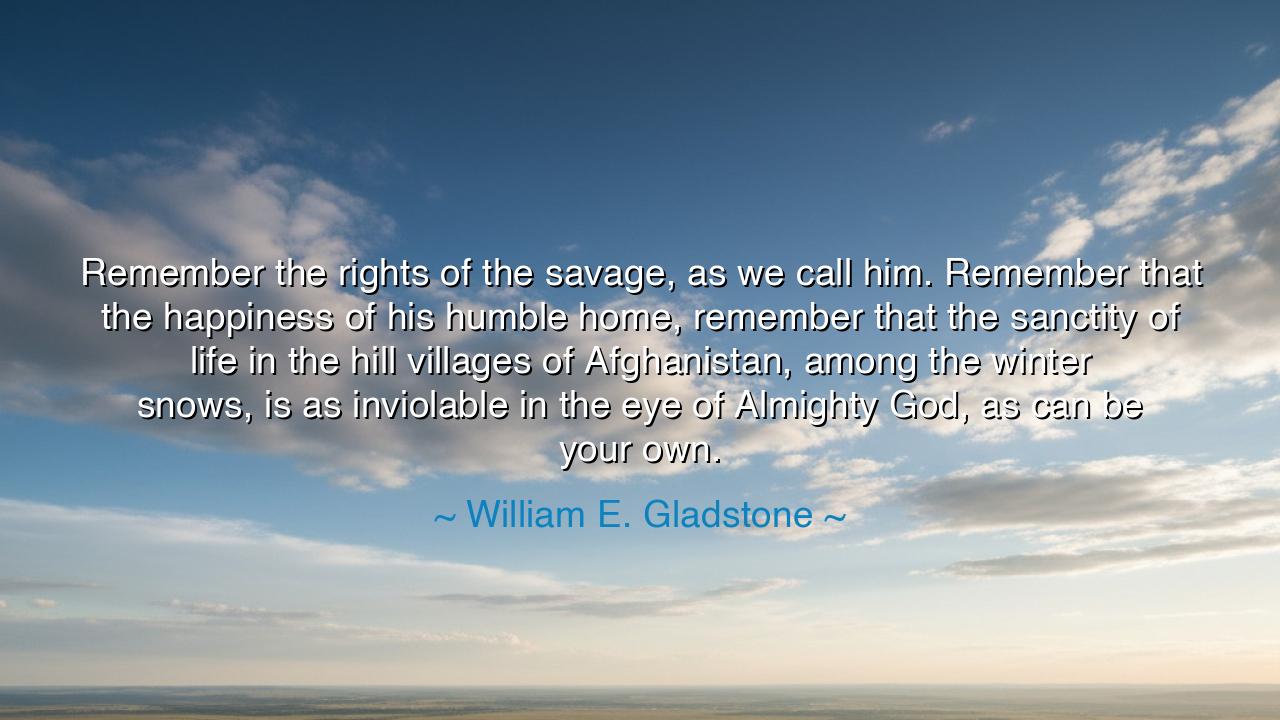
Remember the rights of the savage, as we call him. Remember that
Remember the rights of the savage, as we call him. Remember that the happiness of his humble home, remember that the sanctity of life in the hill villages of Afghanistan, among the winter snows, is as inviolable in the eye of Almighty God, as can be your own.






“Remember the rights of the savage, as we call him. Remember that the happiness of his humble home, remember that the sanctity of life in the hill villages of Afghanistan, among the winter snows, is as inviolable in the eye of Almighty God, as can be your own.” Thus spoke William E. Gladstone, the great statesman of Victorian England, whose heart was stirred not only by politics, but by conscience. In these words, spoken more than a century ago, he reached beyond the narrow boundaries of empire and called to the eternal truth — that all life, however humble, holds equal worth before God. His was not the voice of conquest, but of compassion; not of power, but of justice.
In this statement, Gladstone confronts the arrogance that often accompanies civilization. In his time, the British Empire stretched across continents, and men spoke of bringing “order” and “enlightenment” to so-called savages. But Gladstone, with the wisdom of one who had gazed long into both history and the human soul, saw the danger in such pride. He reminded his nation that the rights of the humble — even of those who lived in the snowy mountains of Afghanistan, far from the comforts of London — were sacred. To him, the hand that tills a poor man’s field, the laughter of a village child, the hearth where a mother prays for her family — these were all as holy as the wealth and privilege of the mighty.
His words were not spoken in comfort, but amid war and controversy. The British invasion of Afghanistan in the late nineteenth century, part of the long struggle known as the Great Game, had brought suffering to countless innocent people. Armies clashed among the mountain passes, and villages were burned in the name of imperial glory. Gladstone, a man of faith and moral clarity, rose against this blindness. He declared that no banner, no empire, and no ambition could sanctify the destruction of another’s home. “Remember,” he implored, “the sanctity of life in the hill villages of Afghanistan.” His plea was not only political — it was spiritual, a call to humility before the divine equality of all souls.
In his vision, one hears echoes of the ancient prophets, who cried out against kings when they forgot mercy. The wisdom of the ancients taught that the mark of a just ruler is compassion for the weak — that true greatness lies not in dominion, but in restraint. The Romans, in their days of empire, once learned this lesson too late, for they mistook conquest for civilization. Gladstone, steeped in classical learning, saw the same peril in his own time and warned that nations which forget the humanity of others soon lose their own. His call to remember “the rights of the savage” was not irony — it was revelation. He was saying: There are no savages in the eyes of God. Only men, all brothers under the same sky.
Consider how this truth repeats across ages. When Mahatma Gandhi, decades later, faced the British with nothing but faith and courage, he too spoke from the same eternal well — that the life of a villager in India is no less sacred than the life of a minister in London. And when, in our own time, nations war in the name of progress, or look down upon those who live differently, the echo of Gladstone’s words resounds still. The happiness of the humble home is not a small thing. It is the foundation of humanity’s peace. When one nation tramples another’s dignity, it does not advance civilization — it wounds the soul of the world.
Gladstone’s message is both tender and commanding. He does not call for pity, but for reverence — a recognition that all peoples, however distant or strange, share the same divine breath. To “remember the rights of the savage” is to remember that justice and compassion are universal laws, not inventions of culture or class. It is to know that morality must not stop at the border of one’s nation or faith. The sanctity of life, wherever it dwells — in the marble halls of the West or the snow-covered villages of the East — is equal in the sight of the Eternal.
So let this be the lesson, O listener of later days: never let the cloak of superiority blind you to the light of another’s humanity. Whether you rule or serve, whether you are rich or poor, remember that the worth of a man is not measured by his power, but by his kindness. Be wary of the voices that call others “lesser,” for such words are the beginnings of cruelty. Instead, honor the happiness of humble homes — the quiet hearths, the unspoken hopes, the fragile peace that binds families together across the earth.
Thus, the wisdom of William E. Gladstone endures. He teaches that true civilization is not conquest, but compassion; not domination, but respect. The hand that reaches out in mercy is stronger than the hand that strikes. The leader who protects the weak is nobler than the general who conquers the strong. And the nation that remembers the sanctity of all life — in every valley and on every mountain — will not only endure in history, but stand righteous in the eyes of God.






AAdministratorAdministrator
Welcome, honored guests. Please leave a comment, we will respond soon